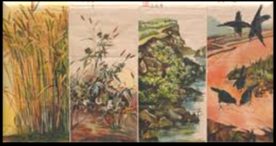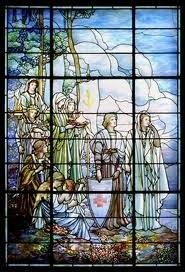The Parable of the Sower

The Parable of the Sower is one of the parables where Jesus explained the parable to the disciples. It sets precedence in how we look at the other parables then how we can have eyes that see and ears that hear.
Matthew 13:1-53
The Parable of the Sower went like this;
A sower went forth to sow; and when he sowed some seeds fell by the way side, and the fowls came and devoured them up.
Some fell upon stony places, where they had not much earth: and forthwith they sprung up, because they had no deepness of earth: And when the sun was up, they were scorched; and because they had no root, they withered away.
And some fell among thorns; and the thorns sprung up, and choked them:
But other fell into good ground, and brought forth fruit, some an hundredfold, some sixtyfold, some thirtyfold.
Who hath ears to hear, let him hear. And the disciples came, and said unto him, Why do you speak unto them in parables? Jesus answered and said unto them, Because it is given unto you to know the mysteries of the kingdom of heaven, but to them it is not given.
For whosoever has, to him shall be given, and he shall have more abundance: but whosoever has nothing, from him shall be taken away even that he has.
Jesus said that is why He speaks to them in parables: because they seeing see not; and hearing they hear not, neither do they understand.
For this people’s heart is made dull or they have been made stupid, and their ears are dull of hearing, and their eyes they have closed; lest at any time they should see with their eyes, and hear with their ears, and should understand with their heart, and should be converted, and I should heal them.
Speaking to the disciples Jesus says they are blessed are their eyes, for they see: and their ears, for they hear.
Jesus said that many prophets and righteous men have desired to see those things which you see, and have not seen them; and to hear those things which you hear, and have not heard them.
What Can This Lesson Teach Us?
This is one of the parables where Jesus explained them to the disciples. It sets precedence in how we look at the other parables then how we can have eyes that see and ears that hear.
The seed is the Word of God.
The seeds that fall by the way side are those that hear the Word of God; then cometh the devil, and takes away the word out of their hearts, lest they should believe and be saved.
The seeds that fell on the rock are those, which, when they hear the Word of God, receive the word of God with joy; But these do not have roots in the Word. So for a while they believe. Then comes times of temptation and they fall away.
The seeds that fell among thorns are those, which, when they have heard the Word of God, they go forth, and are choked with cares and riches and pleasures of this life, and bring no fruit to perfection.
The seeds that fell on the good ground are those, which in an honest and good heart, having heard the word of God, keep it, and bring forth fruit with patience.
When you hear the Word of God what type of seed are you? Are you hearing with an honest and good heart? What does that mean to you having an honest and good heart? How does one receive an honest and good heart? What does it mean to bring forth fruit with patience?
Cite Article Source
MLA Style Citation:
Holstein, Joanne “The Parable of the Sower:.” Becker Bible Studies Library Jan 2015.< https://guidedbiblestudies.com/?p=1872,>.
APA Style Citation:
Holstein, Joanne (2015, January) “The Parable of the Sower:.” Becker Bible Studies Library. Retrieved from https://guidedbiblestudies.com/?p=1872,.
Chicago Style Citation:
Holstein, Joanne (2015) “The Parable of the Sower:.” Becker Bible Studies Library (January), https://guidedbiblestudies.com/?p=1872, (accessed).


